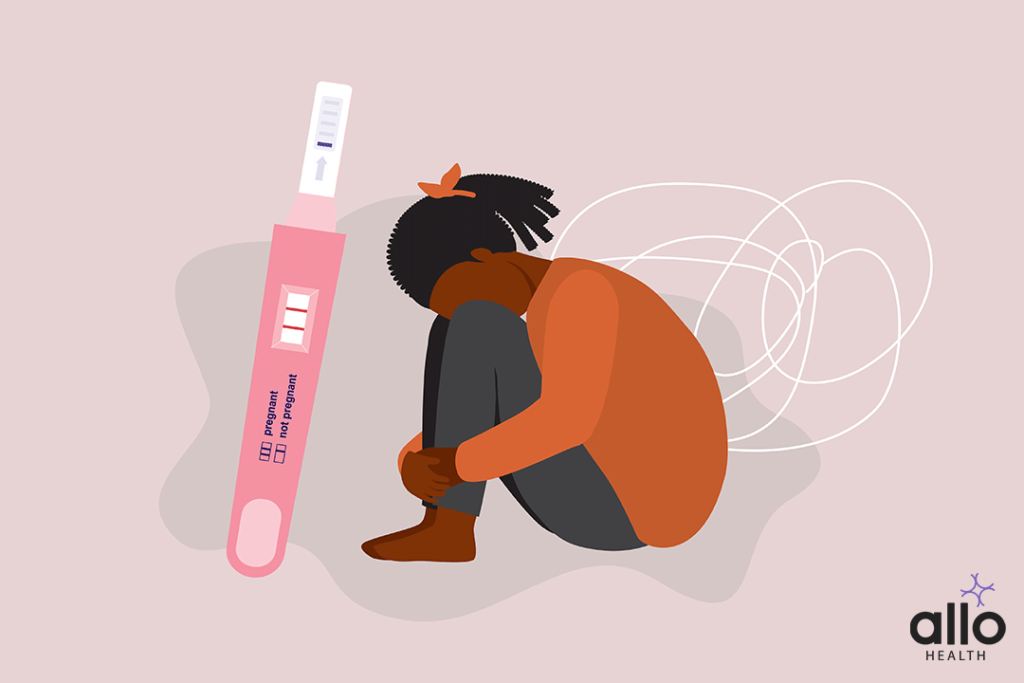Pregnancy Scares: Understanding Contraceptive Options

Allo Health is dedicated to personalized well-being, offering support and trusted information tailored to individual health goals. The platform emphasizes human-generated content, led by a distinguished medical team of experts, including physicians and sexual health specialists. Their commitment to credibility involves rigorous fact-checking, authoritative research, and continuous updates to ensure accurate, up-to-date information. Allo Health's unique approach goes beyond conventional platforms, providing expert-led insights and a continuous commitment to excellence, with user feedback playing a crucial role in shaping the platform's authoritative voice.

Dr Dodda Basavaraj did his MBBS from Vijayanagara Institute Of Medical Sciences, Ballari . His domain of interest always lied in obstetrics , gynaecology and sexual health. He has worked as Medical officer, Tele-consultation doctor at tertiary and primary health care sectors in Karnataka . He believes strongly in medical practice which is evidence based, non-judgemental and patient centric.
Why This Was Upated?
Our experts continually monitor the health and wellness space, and we update our articles when new information became available.
Updated on 22 December, 2023
- Article was updated as part of our commitment to diversity, equity, and inclusion.

"The following blog article provides general information and insights on various topics. However, it is important to note that the information presented is not intended as professional advice in any specific field or area. The content of this blog is for general educational and informational purposes only.
Book consultation
The content should not be interpreted as endorsement, recommendation, or guarantee of any product, service, or information mentioned. Readers are solely responsible for the decisions and actions they take based on the information provided in this blog. It is essential to exercise individual judgment, critical thinking, and personal responsibility when applying or implementing any information or suggestions discussed in the blog."
A pregnancy scare is a situation where someone fears they might be pregnant due to unprotected sexual activity or contraceptive failure. They can be a stressful and overwhelming experience for anyone, especially those who are not prepared for a pregnancy. Contraception is a crucial aspect of family planning that can help prevent unintended pregnancies.
Contraception Methods
Hormonal Contraception
Hormonal contraception works by preventing ovulation and thickening cervical mucus to prevent sperm from reaching the egg, thus, reducing the risk of pregnancy. This type of contraception comes in various forms, such as:
- Birth control pills:The pill is one of the most commonly used methods of contraception. It is taken orally every day at the same time to maintain its effectiveness.
- Patch:A patch is a small adhesive strip that releases hormones through the skin. It needs to be changed once a week.
- Vaginal ring:A vaginal ring is a small, flexible ring that is inserted into the vagina and releases hormones for three weeks.
- Hormonal injections are given every three months.
It is essential to consult with a healthcare provider to determine which form of hormonal contraception is suitable for you, as it may have side effects such as weight gain, mood swings, and headaches.

Barrier Contraception
Barrier contraception works by preventing sperm from reaching the egg. This type of contraception includes:
- Condoms:Condoms are a popular choice for both men and women. They are easy to use, readily available, and help prevent the transmission of sexually transmitted infections (STIs).
- Diaphragms:A diaphragm is a shallow silicone cup that is placed over the cervix to prevent sperm from reaching the egg.
- Cervical cap:The cervical cap is a silicone cap that is inserted into the vagina and covers the cervix to prevent sperm from entering the uterus.
Barrier contraception may have lower efficacy rates compared to hormonal contraception, but it is still an effective method when used correctly.
Intrauterine Devices (IUDs)
An intrauterine device (IUD) is a small T-shaped device that is inserted into the uterus by a healthcare provider. There are two types of IUDs available:
- Hormonal IUD: A hormonal IUD releases a small amount of progestin into the uterus, which thickens cervical mucus and prevents fertilization.
- Copper IUD:A copper IUD is a non-hormonal option that uses copper to create an environment that is toxic to sperm, preventing fertilization.
IUDs are long-term contraceptives that can last for up to 10 years, depending on the type.
Emergency Contraception
Emergency contraception, also known as the morning-after pill, is a form of contraception that can be used after unprotected sex or contraceptive failure. Emergency contraception is not meant to be used as a regular form of contraception and should only be used in emergencies.
There are two types of emergency contraception:
- Copper IUD:A copper IUD can be inserted up to five days after unprotected sex and is the most effective form of emergency contraception.
- Morning-after pill: The morning-after pill (emergency contraceptive pill) is a pill that can be taken up to 72 hours after unprotected sex. It is less effective than the copper IUD but is readily available over the counter.
Contraception is an essential aspect of family planning that can help prevent unintended pregnancies. There are various forms of contraception available, including hormonal contraception, barrier contraception, IUDs, and emergency contraception. It is crucial to consult with a healthcare provider to determine which form of contraception is suitable for you and to ensure proper usage to maximize effectiveness.
Form Of Birth Control Options

Birth control options are an essential aspect of reproductive health for both men and women. They help individuals to make informed decisions about their sexual health and family planning. With the wide range of birth control options available today, it can be challenging to choose the right method.
Hormonal Methods
Hormonal birth control methods work by altering the body’s natural hormonal balance to prevent pregnancy. These methods include birth control pills, patches, injections, vaginal rings, and hormonal intrauterine devices (IUDs). The hormones in these methods primarily prevent ovulation or fertilization, but they can also thicken cervical mucus, making it harder for sperm to reach the egg.
Birth control pills are one of the most common forms of hormonal contraception. They are available in two types: combination pills that contain both estrogen and progestin, and progestin-only pills. Birth control patches are another option that uses hormones to prevent pregnancy. The patch is worn on the skin and replaced weekly.
Hormonal injections are another option that provides long-term contraception for up to three months( comment – 12 to 18 weeks depending on type) . Vaginal rings are also a hormonal method that is inserted into the vagina for three weeks at a time, then removed for one week.
Hormonal IUDs are a highly effective long-acting reversible contraceptive method. They release progestin into the uterus, preventing pregnancy for up to five years. While these methods are highly effective, they can have side effects such as weight gain, mood changes, and nausea.
Barrier Methods
Barrier methods work by physically preventing sperm from reaching the egg. These methods include condoms, diaphragms, cervical caps, and spermicides. Condoms are the most commonly used form of barrier contraception, and they also provide protection against sexually transmitted infections (STIs).
Diaphragms and cervical caps are also barrier methods that are inserted into the vagina before sex. They work by blocking the cervix and preventing sperm from reaching the egg. Spermicides are substances that kill or immobilize sperm, and they are often used in conjunction with other barrier methods.
Barrier methods are generally safe and have few side effects. However, they are less effective than hormonal methods, and they must be used correctly and checked for damage every time to be effective.
Long-Acting Reversible Contraception (LARC)
LARC methods are highly effective and provide long-term contraception. These methods include hormonal and non-hormonal intrauterine devices (IUDs) and contraceptive implants. Hormonal IUDs and contraceptive implants release hormones that prevent pregnancy for several years, while non-hormonal IUDs work by creating an inhospitable environment for sperm.
LARC methods are over 99% effective and are considered the most effective form of contraception available. They are also convenient and require little to no maintenance once inserted. However, they can have side effects such as irregular bleeding, and they must be inserted and removed by a healthcare professional.
Sterilization
Sterilization is a permanent form of contraception that involves surgical procedures. Female sterilization is commonly known as tubal ligation, which involves cutting, tying, or blocking the fallopian tubes. Male sterilization is known as a vasectomy, which involves cutting or blocking the vas deferens, preventing sperm from reaching the semen.
Sterilization is an effective form of contraception but is a permanent decision. These procedures are generally safe, but they can have side effects such as pain, bleeding, and infection.
What Do I Do When I Have a Pregnancy Scare?

Pregnancy scares can be overwhelming and stressful, especially if you are not ready to have a child. It is important to know what steps to take when you suspect that you may be pregnant.
Take a pregnancy test
The first thing you should do when you have a pregnancy scare is to take a pregnancy test. You can purchase a home pregnancy test kit from a drugstore or online. These tests are easy to use, and you can get accurate results within a few minutes. Follow the instructions on the package carefully to ensure that you get accurate results. If you are unsure how to take a pregnancy test or interpret the results, consult a healthcare provider.
Consider your options
If the pregnancy test comes back positive, you need to consider your options. You may choose to continue with the pregnancy and have a baby, or you may choose to terminate the pregnancy. It is essential to consider all the factors that could influence your decision, such as your personal beliefs, financial situation, and support system. Talk to your partner, family members, or a trusted friend about your options and the decision you want to make.
Seek medical adviceIf you have a positive pregnancy test, it is crucial to seek medical advice as soon as possible. Make an appointment with your healthcare provider or a family planning clinic to confirm the results and discuss your options. Your healthcare provider can provide you with essential information about prenatal care, abortion, and adoption. They can also discuss any medical conditions that may affect your pregnancy.
Practice safe sex
Whether or not you are pregnant, it is essential to practice safe sex. Use condoms or other forms of contraception to prevent unplanned pregnancies and protect yourself against sexually transmitted infections (STIs). Talk to your healthcare provider about the best contraceptive method for you and your partner.
Take care of your physical and mental health
Pregnancy scares can be stressful, and it is important to take care of your physical and mental health. Get enough rest, eat a healthy diet, and exercise regularly. Seek emotional support from partner, friends, family members, or a mental health professional. They can provide you with the emotional support you need during this challenging time.
A surprise pregnancy can be overwhelming, but it is important to take the right steps when you suspect that you may be pregnant. Take a pregnancy test, consider your options, seek medical advice, practice safe sex, and take care of your physical and mental health. Remember, no matter what decision you make, it is your right to choose what is best for you and your future.
Pregnancy Signs:
Pregnancy is a life-changing experience that brings joy and excitement to women and their loved ones. However, many women may not be sure if they are pregnant, especially in the early stages.
Signs and Symptoms of Pregnancy
The signs and symptoms of pregnancy can vary from woman to woman, but some of the most common ones include:
- Missed Period:A missed period is usually the first sign of pregnancy. However, it is important to note that some women may experience light bleeding or spotting during the first few weeks of pregnancy.
- Nausea and Vomiting: Many women experience nausea and vomiting, especially during the first trimester.
- Breast Changes:The breasts may become swollen, sore, or tender, and the nipples may darken.
- Fatigue:Pregnant women may feel tired and exhausted, especially during the first trimester.
- Increased Urination: Pregnant women may need to urinate more often, especially during the first and third trimesters.
- Food Aversions and Cravings: Pregnant women may experience food aversions and cravings due to hormonal changes.
- Mood Swings:Hormonal changes during pregnancy may cause mood swings, irritability, and other emotional changes.
Take a Pregnancy Test
If you suspect that you may be pregnant, the best way to confirm it is by taking a pregnancy test. Here’s how to take a pregnancy test:
- Buy a Home Pregnancy Test:Home pregnancy tests are available at most drug stores and pharmacies. Look for a test that is easy to use and has high accuracy rates.
- Read the Instructions Carefully:Be sure to read the instructions on the pregnancy test carefully before using it.
- Collect Your Urine:Collect your urine in a clean, dry container. Make sure to collect the first urine of the morning as it has the highest concentration of the hormone hCG (pregnancy hormone), which is the hormone that is detected in pregnancy tests.
- Perform the Test:Follow the instructions on the pregnancy test and perform the test as directed. Most pregnancy tests will give you results within a few minutes.
- Interpret the Results:If the pregnancy test is positive, it means that you are pregnant. If the test is negative and you still have pregnancy symptoms, you may want to repeat the test in a few days or see your doctor.
When to See a Doctor?

If you have a positive pregnancy test or if you experience any of the symptoms of pregnancy, it is important to see a medical provider for advice as soon as possible. Your doctor can confirm the pregnancy and provide you with important information about prenatal care, nutrition, and lifestyle changes.
In addition, you should see a doctor if you experience any of the following symptoms:
- Severe or Prolonged Vomiting:Severe or prolonged vomiting can lead to dehydration and other complications.
- Abdominal Pain:Abdominal pain can be a sign of an ectopic pregnancy or other complications.
- Vaginal Bleeding:Vaginal bleeding can be a sign of a miscarriage or other complications.
- High Fever:A high fever during pregnancy can be a sign of an infection, which can be harmful to you and your baby.
If you suspect that you may be pregnant, pay attention to the signs and symptoms and take a pregnancy test to confirm it. If the test is positive, see a doctor as soon as possible to begin prenatal care and ensure a healthy pregnancy.
Talking To Your Partner(s) About A Pregnancy Scare
Pregnancy scares can be a stressful and emotional experience for both partners. It’s essential to handle the situation with care and sensitivity, particularly when communicating with your partner.
Choose the right time and place
It’s important to choose the right time and place to talk about a pregnancy scare with your partner. Avoid bringing up the topic when your partner is in a rush or preoccupied with other things. Find a private and comfortable place where you can have an open and honest conversation without interruptions or distractions.
Be honest
Honesty is the best policy when it comes to pregnancy scares. Don’t hide your feelings or hold back information from your partner. It’s important to be upfront and transparent about your concerns, fears, and doubts. Remember, this is not the time to be defensive or judgmental; it’s about supporting each other and finding a solution together.
Listen actively
Listening actively is a crucial aspect of effective communication, particularly during a pregnancy scare. Take the time to understand your partner’s feelings and concerns, and show empathy and support. Avoid interrupting or dismissing their thoughts, even if you disagree with them. By actively listening, you can build trust and strengthen your relationship.
Avoid blaming or accusing
Pregnancy scares can be a sensitive topic, and it’s essential to avoid blaming or accusing your partner. Remember, it takes two to tango, and both partners are responsible for their actions. Instead of pointing fingers, focus on finding a solution together and learning from the experience.
Discuss your options
If you and your partner are facing a pregnancy scare, it’s important to discuss your options. Consider scheduling a doctor’s appointment to get a pregnancy test and explore your choices, including parenting, adoption, or abortion. It’s important to keep an open mind and support each other’s decision, regardless of what it may be.
Plan for the future
A pregnancy scare can be a wake-up call for many couples, and it’s important to plan for the future. Discuss your long-term goals and aspirations, including family planning, career, and personal development. This can help you align your priorities and strengthen your relationship.
A pregnancy scare can be a stressful and emotional experience for both partners. By choosing the right time and place, being honest, listening actively, avoiding blaming or accusing, discussing your options, and planning for the future, you can navigate this situation together and strengthen your relationship. Remember, communication is key, and a little empathy and support can go a long way.
Key Takeaways
- A pregnancy scare is a situation where someone fears they might be pregnant due to unprotected sexual activity or contraceptive failure.
- It can be a stressful and overwhelming experience, especially for those who are not prepared for a pregnancy.
- Contraceptive methods, also known as forms of birth control, play a crucial role in preventing unintended pregnancies.
- Hormonal contraception, barrier contraception, intrauterine devices (IUDs), and emergency contraception are some common forms of birth control.
- If facing a pregnancy scare, individuals should take a pregnancy test, consider their options, seek medical advice, practice safe sex, and take care of their physical and mental health. Additionally, open and honest communication with their partner is crucial during this time.
Frequently Asked Questions
Q: What is a pregnancy scare?
A: A pregnancy scare is a situation where someone fears they might be pregnant due to unprotected sexual activity or contraceptive failure.
Q: What are the common signs of a pregnancy?
A: Common signs include a missed period, nausea, breast changes, fatigue, increased urination, food aversions, and mood swings.
Q: Can stress and anxiety cause a delayed period and contribute to a pregnancy scare?
A: Yes, stress and anxiety can disrupt hormonal balance and lead to delayed or irregular periods, contributing to a pregnancy scare.






































